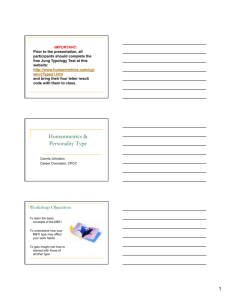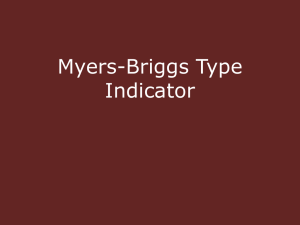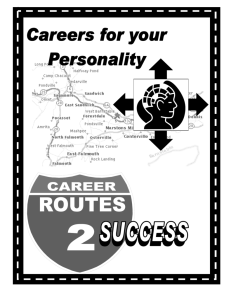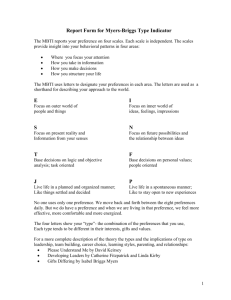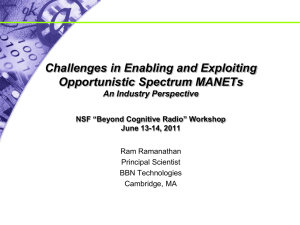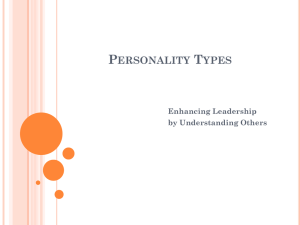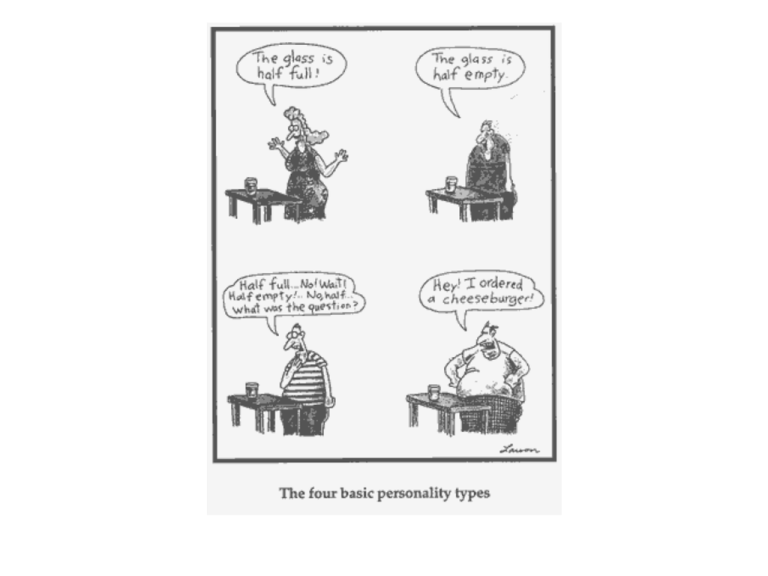
Myers-Briggs Type Indicator
Career Applications
The MBTI measures
• Preferences
• Tendencies
• Characteristics
The MBTI does not measure
• Intelligence (IQ)
• Emotional Maturity
• Interests
• Psychiatric Disturbances
Understand Your Personality
Type
• Knowledge of your personality and the
personality of others will empower you to
communicate and work effectively with
others!
MBTI
• There are four major dimensions
1.Extraversion or Introversion
(Extraversion is the spelling in the psych
literature. Extro… is the popular spelling.)
2.Sensing or Intuitive
3.Thinking or Feeling
4.Judging or Perceptive
Gaining Energy
• Extraversion (E)
• Introversion (I)
• Focused on the
outside world and
get energy through
interacting with
people and doing
things.
• Focused on the
inner world and get
energy through
reflecting on
information, ideas
and/or concepts.
• Extraverts are energized by other people and
external experiences while
• Introverts are energized by inner resources and
inner experiences.
• Extraverts act and then maybe think while
• Introverts think and then maybe act.
• Extraverts are often friendly, talkative and easy
to know while
• Introverts are often reserved, quiet and hard to
know.
• Extraverts express emotions more easily while
• Introverts bottle up emotions.
• Extraverts need relationships (like everyone) but
• Introverts are often more aware of the need for
privacy.
• Extraverts can seem a bit shallow to
introverts while
• Introverts can seem a bit withdrawn to
Extraverts
• Extraversion needs
introversion for
balance
• Introversion needs
extraversion for
balance
• In school what are some of the
advantages and disadvantages of being
an Extravert or an Introvert?
• In looking for work what advantages do
each have (and disadvantages)?
• In relationships?
Gathering Information: Your preferred
way of perceiving the world…
• Sensing (S)
• Intuition (N)
• Notice and trust
facts, details, and
present realities.
• Attend to and trust
interrelationships,
theories and future
possibilities.
• Sensing types like
things that are
definite, measurable.
• iNtuitive types like
opportunities to be
inventive.
• Sensing types start at the beginning, taking
things a step at a time while
• iNtuitive types jump in anywhere and leap over
steps.
• Sensing types live in the present and enjoy
what’s there while
• iNtuitive types live toward the future anticipating
what might be.
• Sensing types prefer handling practical matters
while
• iNtuitive types imagine possibilities.
• Sensing types like set procedures and
established routines while
• iNtuitives like change and variety.
• Sensing types may seem too materialistic
to iNtuitives while
• iNtuitives may seem like dreamers to
Sensing types.
• Sensing types
look at specific
parts and pieces.
• Intuitive types look at
patterns and
relationships.
• Sensing needs
iNtuition for balance.
• iNtuition needs
Sensing for balance.
• Can you think of some occupations that
would appear to Sensing types?
• Can you think of some occupations that
would appear to iNtuitive types?
• Who’d more likely become a prison guard?
• Sensing (88%)
Making Decisions - Your preferred way of
deciding…
• Thinking (T)
• Feeling (F)
• Make decisions
using logical,
objective analysis.
• Make decisions to
create harmony by
applying personcentered values.
• Thinking types decide
with their head while
• Feeling types decide
with their heart.
• Thinking types go by logic and say “The
sensible thing to do is…” while
• Feeling types go by personal conviction
and say “What I feel is…”.
• Thinking types are more concerned with
‘truth and justice’ while
• Feeling types are concerned with
relationships and harmony.
• Thinking types see themselves as onlookers from outside the situation
(objective types) while
• Feeling types see things as a participant
from inside the situation.
• Thinking types take the long view while
• Feeling types take the immediate and
personal view.
• Thinking types
spontaneously find
flaws…
• Feeling types
spontaneously
appreciate…
• Thinking types are
good at analyzing
plans…
• Feeling types are
good at
understanding
people
(and maybe dogs)
• Thinking types may seem cold and
condescending to Feeling types while
• Feeling types seem fuzzy-minded and emotional
to Thinking types.
• This is the only dimension where there is a sex
difference with 60% of males being Thinking
types and 60% of females being Feeling types.
Which type would be more likely
to loan their assignment to a
fellow student even when they
really didn’t want to?
• Thinking needs
feeling for balance.
• Feeling needs
thinking for balance.
Dealing with the World
Your Personal Style…
• Judging (J)
• Perceiving (P)
• Organized, orderly
and decisive.
• Flexible, adaptable
and like to keep
options open.
• Judging types prefer
an organized
lifestyle…
• They need to adapt to
being flexible.
• Perceiving types
prefer a flexible
lifestyle…
• They need
to adapt
to be organized.
• Judging types like
definite order and
structure.
• They like to go from A
to Z.
• They understand
rules and the need for
them.
• Perceiving
types like to
go with the
flow.
• More likely
to take risk
and plunge
right in.
• Less likely
to read
instructions
More likely to be impulsive…
• Judging types prefer to have life under control.
• Stress is not having control.
• Perceiving
types prefer to
experience life
as it happens.
• Naturally
tolerant of time
pressure; work
best close to
deadlines.
• Judging types enjoy
being decisive.
• The student who
picks an essay topic
too quickly may have
to sacrifice a better
idea later.
Perceiving types prefer being curious and
discovering surprises.
• Judging
types like
clear limits
and
categories.
• Plan,
focus,
complete,
move on.
• Perceiving types like
the freedom to
explore without limit.
• They like to start (but
don’t always finish).
• Judging types
are comfortable
bringing things
to closure.
• Judging needs
perception for
balance.
• Perceiving needs
judgment for balance.
16 MBTI Personalities
Sensing
iNtuitive
Introvert
Extravert
ISTJ
doing what
should be done
ISFJ
a high sense
of duty
INFJ
an inspiration
to others
INTJ
everything has
room for
improvement
ISTP
ready to try
anything once
ISFP
sees much but
shares little
INFP
performing
noble service
to aid society
INTP
a love of
problem solving
ESTP
the ultimate
realists
ESFP
you only go
around once
in life
ENFP
giving life an
extra squeeze
ENTP
one exciting
challenge after
another
ESTJ
life's
administrators
ESFJ
hosts and
hostesses of
the world
ENFJ
smooth talking
persuaders
ENTJ
life's natural
leaders
But the middle two letters are the best
predictor of career choice…
•
•
•
•
•
•
•
•
ISTJ
ISTP
ESTP
ESTJ
ISFJ
ISFP
ESFP
ESFJ
•
•
•
•
•
•
•
•
INFJ
INFP
ENFP
ENFJ
INTJ
INTP
ENTP
ENTJ
So, you will be…
•
•
•
•
Sensing/Thinking
Sensing/Feeling
iNuition/Feeling
iNtuition/Thinking
ST –Sensing Thinking Types
• Focus on facts but
apply impersonal
analysis to what they
observe or perceive.
Practical, matter-offact, skilled at dealing
with money, objects,
information or data.
• Accountants -64%
• Business Students
51%
• Bank employees –
47%
• Also, production,
construction, applied
science
• NOT occupations like
counseling, nursing.
SF - Sensing Feeling Types
• Focus on facts but
handle what they
perceive with
personal warmth,
sympathy,
friendliness. Suited to
practical help and
service occupations.
• Sales/customer
relations – 81%
• Nursing – 44%
• Education – 42%
• Other medical and
health jobs,
community service,
elementary/physical
education
• NOT law or science.
NF – iNtuition Feeling Types
• Perceive possibilities
and handle what they
perceive with
personal warmth,
enthusiasm and
insight. Have
success in
understanding people
and communication.
• Student counselors –
76%
• Creative writers –
65%
• Journalism students
42%
• Nursing – 34%
• Also, teaching,
research, arts
• NOT accountants
NT – iNtuition Thinking Types
• Perceive possibilities
and handle what they
perceive with
impersonal analysis.
Logical and
ingenious. Use
abilities in theoretical
and technical
development.
• Research scientists –
77%
• Science students –
57%
• Law students – 42%
• Also, inventors,
managers,
forecasters, securities
analysts
• NOT in sales, nursing
Implications of Wrong Choice
• One service company with work oriented
to Feeling types found that after 9 years
80% of the Thinking types had quit while
80% of the Feeling types were still there.
• One company asked its supervisor to rate
its pool of 16 data entry personnel
• Who is more suited to that sort of work:
Introverts or Extraverts?
• All eight Introverts received
a higher rating.
• In life, you can be a failure at the wrong
job and an outstanding success at the
right job.
• Which occupation is the right one for you?

